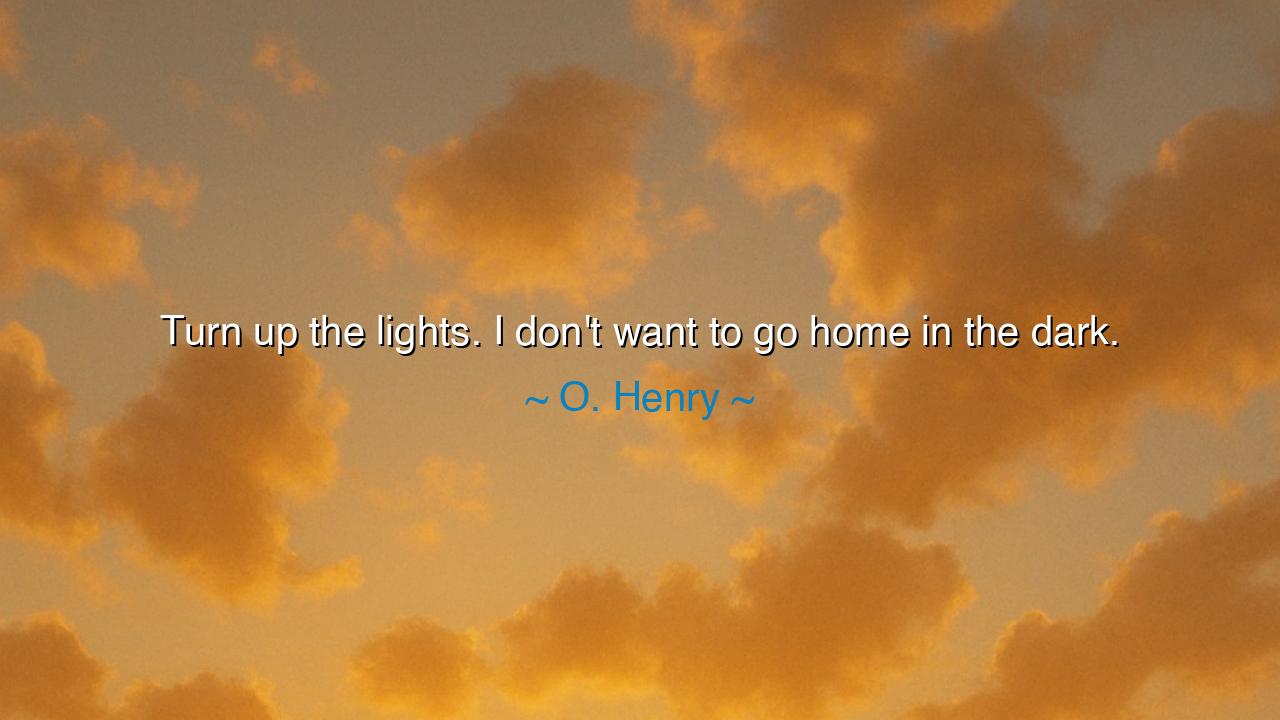
Turn up the lights. I don't want to go home in the dark.






In the twilight of his life, as the shadows lengthened and silence gathered about his bed, the storyteller O. Henry — born William Sydney Porter — spoke softly his final words: “Turn up the lights. I don’t want to go home in the dark.” To the world, he had been a weaver of irony and tenderness, a master of tales where fate played with men and mercy redeemed them. Yet in that last utterance, half literal and half symbolic, he revealed a truth greater than all his stories — the yearning of the human spirit for light, for clarity, for grace, even at the edge of the unknown. It was not merely a request for brightness in a dim room; it was the cry of a soul that had spent a lifetime in shadow, longing to glimpse the eternal dawn before departing this world.
O. Henry, whose pen painted the beauty of ordinary lives, had himself walked through much darkness. Imprisoned for a crime born of desperation, he found in confinement both punishment and rebirth. It was within those walls that his gift for storytelling flourished — transforming sorrow into laughter, and despair into meaning. Thus, when he spoke of not wanting “to go home in the dark,” his words carried more than fear of physical gloom; they bore the weight of a man who had already known the dark — of guilt, regret, and hardship — and who sought in his final hour the light of understanding, forgiveness, and peace. His home, perhaps, was not a house but the next world — and he wished to arrive there not blind, but illuminated by the truth he had found in life’s shadows.
The ancients, too, knew this longing for light. Socrates, facing death with the calm of wisdom, told his followers that death was not to be feared — it was merely a journey to another place, where truth would shine without the dim glass of human ignorance. And yet, even Socrates, the serene philosopher, asked that his final duty — the offering of a cock to Asclepius — be fulfilled, as if to ensure that his passage would be guided by light. For to die well, one must see clearly. To face the unknown, one must not go home in the dark. Light, in every age, has been the symbol of awareness, of peace, of divine acceptance.
In the story of Beethoven, there lies a similar yearning. Deaf, storm-tossed by fate, he wrestled with despair yet composed symphonies that seemed to break open the heavens. As his life neared its end, he whispered, “I shall hear in heaven.” These words and O. Henry’s share the same soul — both speak of the human hunger for light beyond limitation. Beethoven’s “hearing” was not of ears but of spirit; O. Henry’s “light” was not of lamps but of hope. When he said, “Turn up the lights,” he was not defying death — he was welcoming eternity with open eyes.
There is also a moral flame in these words. To “turn up the lights” is not only a farewell but a commandment to the living. It calls upon us to live brightly, to seek understanding before the end comes. Too many wander through life dimly, content with shadows of truth and flickers of compassion. O. Henry’s dying wish becomes a summons to us all: do not wait until the last moment to turn up the lights of your own soul. Illuminate your days with kindness, courage, and clarity. Refuse to go home — to eternity, to memory, to the end of your story — unawake and unseen.
His words also remind us that darkness is not merely the absence of light, but the absence of awareness. The great task of living is to kindle one’s own lamp — through forgiveness, learning, and love — and to share its flame with others. When you bring light to another’s path, you ensure that your own journey will never be lonely or cold. For every spark of understanding shared, every act of compassion offered, is a lamp turned higher against the great night.
Thus, let O. Henry’s final wish be your daily practice: Turn up the lights. When fear gathers, turn up the lights of faith. When ignorance blinds you, turn up the lights of learning. When cruelty reigns, turn up the lights of mercy. Do not hide from the darkness of the world — confront it, dispel it, transform it. For every soul must one day go home, but only the wise prepare to do so in radiance.
And so, O traveler of life’s winding road, remember this: when your own dusk approaches, may your house be bright with the lamps you have lit — of laughter, of love, of truth. May your spirit rise not through shadow, but through shining. And when at last you, too, whisper, “Turn up the lights,” may it not be a plea born of fear, but a triumphant declaration — that you have walked bravely through the dark, and earned your passage into the everlasting dawn.






AAdministratorAdministrator
Welcome, honored guests. Please leave a comment, we will respond soon